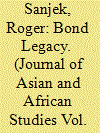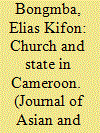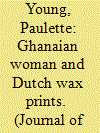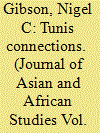|
|
|
Sort Order |
|
|
|
Items / Page
|
|
|
|
|
|
|
| Srl | Item |
| 1 |
ID:
145993


|
|
|
|
|
| Summary/Abstract |
This article surveys the intellectual, fieldwork, and professional career of the anthropologist George Clement Bond. Beginning in 1963, he conducted fieldwork in Zambia over four decades and produced a substantial body of writings on history, ritual, colonialism, and contemporary rural life. He also worked in Uganda in the 1980s on the HIV/AIDS crisis. From 1968, he taught at Columbia University, where he was Director of the Institute of African Studies. Bond’s measured outlook on the interrelated conceptual orientations and practical realities that confront the people anthropologists work among and learn from, and also shape their own circumstances, gave meaning and purpose to his work, which was recognized in honors and awards, speaking invitations, fellowships, and elected professional offices.
|
|
|
|
|
|
|
|
|
|
|
|
|
|
|
|
| 2 |
ID:
145995


|
|
|
|
|
| Summary/Abstract |
In this essay, I discuss church state relations in Cameroon through a hermeneutics of the political theology of Christian Cardinal Tumi. I begin with a brief introduction to set the scene and follow it with a discussion of two major works by Cardinal Tumi. In the first book Tumi provides a detailed analysis of his relationship with the political leaders of Cameroon, and in the second book, he articulates his political theology. I conclude by arguing that one way forward for a political theology in Cameroon is to embrace a broad perspective that is not restricted to one’s personal faith in Jesus Christ.
|
|
|
|
|
|
|
|
|
|
|
|
|
|
|
|
| 3 |
ID:
145994


|
|
|
|
|
| Summary/Abstract |
Using ethnography from a 1995 ‘race’ crisis at Rutgers University, I show the applicability of George Bond’s writings on inequality. Bond’s ideas about social constructions of the past, organic ideologies, and people’s acceptance of structures that subjugate them, are discussed to demonstrate the use of ‘hoaxes’ and clientage in the Rutgers episode. The discussion occurs in the broader context of theory about social inequality and social dominance.
|
|
|
|
|
|
|
|
|
|
|
|
|
|
|
|
| 4 |
ID:
145996


|
|
|
|
|
| Summary/Abstract |
This essay explores the role of textiles, particularly Dutch wax prints, in the lives of women in Ghana, West Africa. Wax prints are colorful message-bearing printed cloths produced in Holland, based on Indonesian batik designs that express meaningful messages. Central to this discussion is the practice of counter-appropriation, that is, how women as individuals are in dialogue with culture by transferring the foreign, in this case Dutch wax prints, into the local in a culturally appropriate way. It positions women not only as cloth distributors and consumers, but also as producers of knowledge through the phenomenon of naming.
|
|
|
|
|
|
|
|
|
|
|
|
|
|
|
|
| 5 |
ID:
145997


|
|
|
| 6 |
ID:
145999


|
|
|
|
|
| Summary/Abstract |
This paper explores the parallel experiences of Black and Brown Americans which are often regarded as mutually exclusive. In discussing the divergent but similar histories of Chicanos and Afro-Americans, I utilize the notion of ‘improvisation’, a re-examination of the 1930 desegregation court case, Roberto Alvarez v. Lemon Grove focusing on how Jim Crow laws also affected the Mexican American Southwest as José Crow custom. Utilizing George Bond’s critical narrative, I argue that the Black/Brown struggle is co-joined in history and the social justice movement. In the Bond tradition, my aim here is to refresh our historical understanding and also to reinvigorate the Black/Brown dialogue.
|
|
|
|
|
|
|
|
|
|
|
|
|
|
|
|
| 7 |
ID:
146000


|
|
|
|
|
| Summary/Abstract |
The Pointillists – notably Georges Seurat and Paul Signac – were à la mode in the late 19th century. Their paintings relied upon a brushwork that placed points of colour to construct their representations. These points were placed such that when looked at as a whole they revealed a picture of some reality. This article argues the possibility of social pointillism, where the picture one is attempting to paint is of what happens in global social realities. Points in pointillism were daubs of colour. They painted pictures on canvases. Points in social pointillism are forces with powers. They create analytic canvases that reveal fields of power in the starry nights of human being. In order to make this argument, discussion begins at the Otello restaurant; proceeds to presentation of social pointillism; explains how social pointillism is relevant to a starry night ontology, and ends by identifying a virtue of employing such pointillism to paint pictures of starry nights.
|
|
|
|
|
|
|
|
|
|
|
|
|
|
|
|
| 8 |
ID:
146001


|
|
|
|
|
| Summary/Abstract |
Reflecting on Contested Terrains and Constructed Categories: Contemporary Africa in Focus, a book George Bond and I edited during our work at the Institute of African Studies at Columbia University in the late 1990s, this paper considers the notion of contested terrains, that for George Bond was played out in the scholarship of African studies, in the daily encounters which he had with his colleagues, and in his Zambian research. Bond understood these contestations as continuously operating on and across and often taking place below the surface or at the margins of insititutions. This paper emerged in response to Bond’s invitation to speak about Fanon’s psychiatry writings and Fanon’s critique of sociotherapy on a panel he was organizing at the American Anthropological Association in 2014 (AAA). After he died, the focus shifted to include Bond alongside Fanon and Foucault underscoring the continued need for dialog on the work of three intellectuals—African-American, African Caribbean, and French. The connections and misconnections between Fanon and Foucault is in part the discussion about contested terrains and the willfulness of constructed categories. Indeed, intellectual genealogies, the unknown connections as well as dividing lines was something that interested Bond, the anthrolopologist of the politics of knowledge.
|
|
|
|
|
|
|
|
|
|
|
|
|
|
|
|
| 9 |
ID:
145998


|
|
|
|
|
| Summary/Abstract |
If, at the turn of the twentieth century, one wished to study the group that WEB Du Bois referred to as Black America’s “Talented Tenth,” Tuskegee Institute’s campus could have served as an ideal laboratory. Still, a century after Booker T. Washington’s death, scholars remain hard-pressed to reconcile the portrait of Tuskegee primarily as a producer of a submissive black laboring class with the school’s illustrious faculty and the progressive black movements, institutions and leaders in education, politics, architecture, medicine and other professions it spawned across the African Diaspora.
|
|
|
|
|
|
|
|
|
|
|
|
|
|
|
|
|
|
|
|
|